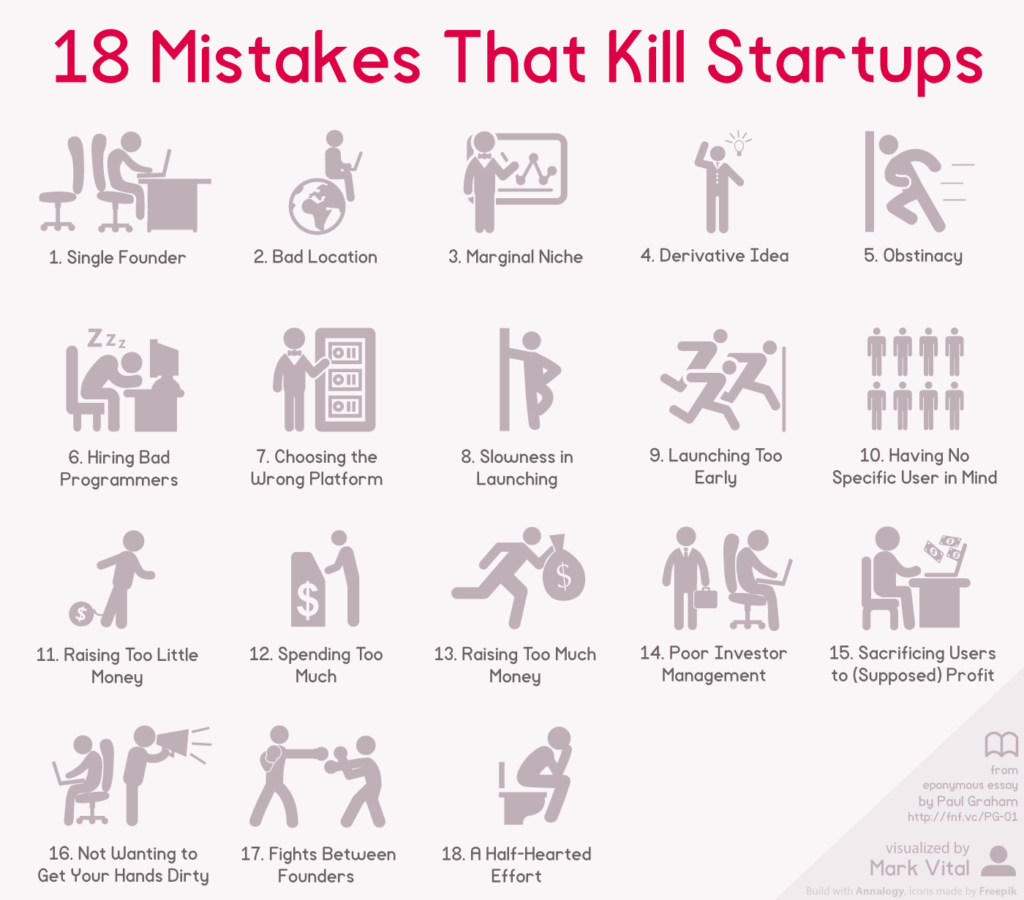Recently, I posted the infographic below on my LinkedIn profile . It generated thousands of shares and hundreds of comments, which proves there is an interested community who are actively seeking information on the topic. To follow-on on this, my next few posts will go into more detail why those 18 mistakes are so deadly for startups.
Mistake #1: Single Founder
As the Founder of the Entrepreneurs’ Organization, Verne Harnish put it: “Do you really believe you can be better alone than with a group of talented people around you? If the answer is yes, then you are the problem!”
So let’s look at the reasons behind going it alone. If an entrepreneur is a single founder this tends to be down to two things. It is either a conscious decision, or the result of an inability to persuade cofounders to get on board with the project. Both cases are bad news. Now let’s go over the most common arguments I hear from entrepreneurs trying to justify why they are alone.
The Gollum
“This is my treasure. MY treasure.” Put slightly more eloquently, this translates as “I want to retain control because I came up with the idea in the first place,” or “I don’t want to be ousted in the future,” or “someone will steal my big idea,” and so forth. This is a legitimate concern, nevertheless, we should really be asking ourselves: What is the goal in launching a startup? The best way not to succeed is not to share: not sharing your idea, not sharing your goal, not sharing the project.
The CFO
“I cannot pay a competitive salary.” Be that as it may, is it really a reason not to work as a team? Which brings us back to sharing – again. When you start a business or jump in as an early collaborator in a startup, the only sure thing is that you will make less money than working in a big corporation. And that this will last for the unforeseen future – maybe even forever. So how can you attract talent to work with you? How about giving share equity and vision a thought?
The All-star
“I am qualified to start a business.” Good for you. You probably are – but can you really grow it alone? A good entrepreneurial team needs alignment of interests and values with collaborators, the capacity to implement – and the right contacts along the value chain of the industry it is competing in. On very rare occasions single individuals can hold all the technical capacities and commercial capacities to be successful in their hands. But if it is the case how long will it be before they burn-out?
We mustn’t fool ourselves with the fact that some entrepreneurs are now very important figures in the media. Steve Jobs needed Steve Wosniak and Mike Makula to start Apple ; and Larry Page and Sergey Brin needed Eric Schmidt to grow Google. And even Marc Zuckerberg didn’t go it alone in the beginning.
Let’s not forget those key factors successful entrepreneurs always highlight; you need somebody you trust to bounce ideas back and forth with, to suffer the ups and downs of the entrepreneurial journey with; and someone humble enough to accept you are not perfect and you do not know it all. One person alone can only experience limited learning in limited time. For a startup what is crucial is the agility and speed to learn, pivot and implement. And alone, this takes so much more time.
